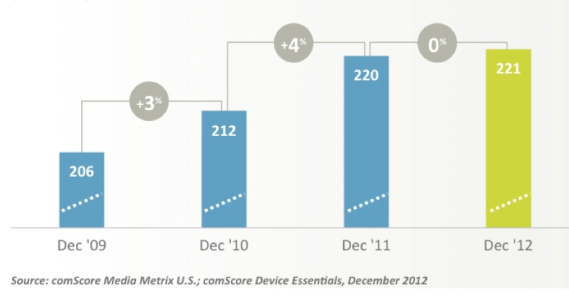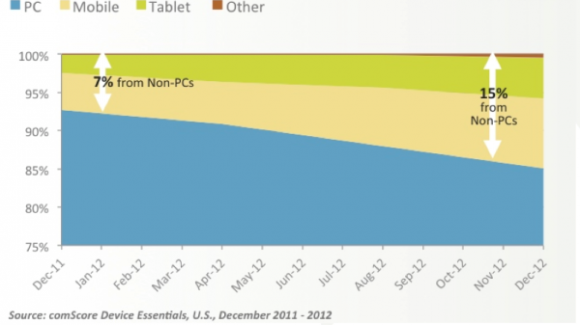The future of local search and how it affects SEO

According to a recent research from the Local Search Association that was recently released for the 4Q of 2012, it is proven that mobile traffic to local sites has been increasing at an exponential growth.
The number of PC users has remained almost unchanged between 2011 and 2012.
[Number of PC Users that Accessed the Internet –In Millions- , Local Search Association]

However when it comes to mobile traffic there’s an increasing yearly growth of the share of mobile traffic (and tablet traffic) compared to desktop traffic which is significantly lower than previous years.
[Trended Share of Web Traffic by Local Search Association]

The fast pace of adoption of smartphones (mobiles and tablets), has started changing the landscape of search, according to this study.
Traffic to online directories and other local resources from non-PC devices more than quadrupled in 2012, reaching 27% share of total web traffic in December 2012 from 6% share in December 2011 and also according to the results of this study 48 % of U.S. mobile users used their devices to access local content in December 2012, up from 42% in December 2011.
It is important to point out, based on the results of this research that in 2012, growth in the number of PC users accessing the Internet flat-lined for the first time. By contrast, the share of web traffic from non-PC devices including smartphones and tablets more than doubled to 15% in December 2012 versus 7% in December 2011.
So, what does this mean for local businesses which is related to the hospitality/travel/tourism industry? There are now endless possibilities of reaching a worldwide audience, as long as they take into consideration a few factors:
- Mobile/Local SEO – Make sure to ‘’micro-optimize’’ your website. Why? The common user behaviour, when a user performs a query, is to type no more than 3 keywords in order to find what he looks for. For example, a luxury hotel with a gourmet restaurant in Athens, that probably is the 2nd revenue generator of the business should be optimized to the extent that when a user/tourist looks for Mediterranean cuisine in Athens, the website should be optimized in all these key phrases and keywords in order to be detectable by users. In some cases as the user types out his query, is able to see results from search engines which they assume that they are close to what the user is searching for. The optimization of your website on the tablet/mobile, should follow, almost the same rules that apply for website that appears on your desktop/laptop.
- Online Advertising: Take advantage of the opportunity of online advertising in order to target all users that utilize tablets, smartphones. Moreover for your local business you can micro-target a very specific region. For example an airport is a good area where you can micro-target your audience.
- Offsite optimization: Adjust your link building efforts to the needs of your mobile website (use of social media, directory submission websites, directories like Yelp etc).
- Web Analytics: Make sure that after you implement the above activities, to receive quantifiable results of your efforts (e.g. use of Google Analytics).

 No Comments
No Comments


